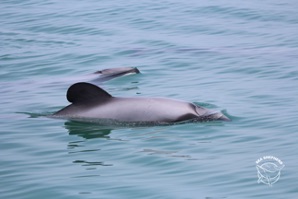Save the Māui Dolphins: Earthrise Legal Fellow Delivers Oral Argument
Alum argues in the Court of International Trade to protect 57 remaining Māui dolphins.
Open gallery

On July 1st, 2021, Earthrise Legal Fellow Dani Replogle ’19 argued in front of the Court of International Trade to protect the 57 remaining Māui dolphins. The argument and supporting brief ask for a ban on the import of fish caught in gillnet and trawl fisheries, and strict compliance enforcement of the Marine Mammal Protection Act (MMPA).
The Māui dolphin is the most endangered marine dolphin in the world, with only 57 individual dolphins one-year or older remaining. Fisheries’ bycatch, particularly bycatch from gillnets and trawls in the dolphins’ range, is the leading threat to the survival of the species. Much of this fishing activity occurs in New Zealand waters, and the U.S. is the second-largest importer of New Zealand seafood.
Earthrise filed a lawsuit in the Court of International Trade alleging the National Marine Fisheries Service and other federal agencies violated the MMPA. The MMPA requires U.S. agencies to prohibit imports from foreign fisheries that fail to prevent bycatch of marine mammals in excess of U.S. standards; the Complaint alleges New Zealand fails to meet these standards. The suit further argues that by failing to ban the import of commercial fish and products derived from fish caught in the Māui dolphin’s range the agencies have violated the MMPA.
Replogle began working on the Māui dolphin case with Earthrise Staff Attorney Lia Comerford in 2020, preparing to file a motion for a preliminary injunction; this sought to force the National Oceanic and Atmospheric Administration (NOAA) to ban imports of fish caught with gill nets and trawls in Maui dolphin habitat. Comerford commenced the initial oral argument upon the government’s voluntary motion for remand of NOAA’s decision not to impose a ban.
After remand, Replogle and Comerford prepared numerous briefs and, upon the Court’s request for oral argument, began preparing for an argument on their renewed motion for a preliminary injunction and two motions to dismiss, one from the U.S. Defendants and one filed on behalf of the government of New Zealand, which intervened in the case. In discussing the suit, Replogle recounted her experience: “I wrote a decent portion of the merits portion of our brief in support of the renewed PI motion, and in doing so, I became pretty familiar with the facts of the case. It’s a very science-heavy case, so when it came time to do the oral argument, it seemed like a good idea for me to do it. Also, with my fellowship coming to an end, I welcomed the learning opportunity and the chance to make all of my Earthrise mentors proud.”
Replogle acknowledged the volume of work required, as the suit involves two preliminary injunctions, two replies, and responses to both the U.S. and New Zealand’s motions to dismiss their first claim. “Prepping for the oral argument itself was a whirlwind because of the unique format Judge Katzmann has for his chambers. He issued questions to each side 10 days before the argument, and we had about 8 days to draft and submit our answers to those questions. The oral argument was limited to rebutting the opposing parties’ responses, so the 2 days before the argument were really intense because we really only had 36 hours with the governments’ responses to prepare our rebuttals.”
After the argument, Replogle, Comerford, and their co-counsel at Sea Shepherd Legal prepared a supplemental brief with additional materials in hopes that the judge will deny the governments’ motions to dismiss and grant the motion for a preliminary injunction. Although preparing to transition away from Earthrise, Replogle remains certain of the importance of this work: “I want to hold the U.S. government accountable for its obligations under the Marine Mammal Protection Act. We’re such a big seafood importer, if we were truly holding other countries to the MMPA’s standards, we could have a really big impact on marine mammal conservation worldwide.” Replogle is optimistic that the judge will rule soon, stating that “at argument, he really seemed to care about the fate of these creatures and we are all hopeful that he will do what is necessary to protect them from this threat to their survival.”
Read more about the initial lawsuit filed in 2020.
Law Communications is located in room 304 of Legal Research Center (LRC) on the law Campus.
MSC: 51
email jasbury@lclark.edu
voice 503-768-6605
Cell: 626-676-7923
Assistant Dean,
Communications and External Relations, Law School
Judy Asbury
Law Communications
Lewis & Clark Law School
10101 S. Terwilliger Boulevard MSC 51
Portland OR 97219

